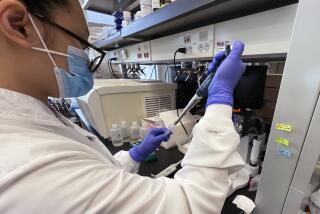Doctors Flout CDC Curbs on Physicians With AIDS : Health: Medical, dental groups ignoring limits on practices. They claim danger to patients is remote.
WASHINGTON — A growing number of medical organizations are refusing to comply with federal recommendations that would restrict the practices of AIDS-infected surgeons and dentists, leaving U.S. public health officials increasingly isolated in their insistence that the restrictions are needed to protect patients from contracting the fatal disease.
The position is an uncommon one for the federal agency that made the recommendations: the Centers for Disease Control. This is the first time that there has been such widespread resistance to an AIDS public policy proposal by the CDC.
The controversy over the guidelines, which call for testing of health care professionals, is certain to accelerate Monday at a CDC meeting in Atlanta. The session is intended to discuss which specific surgical procedures should be among those deemed “exposure-prone” (posing a risk of transmission). Numerous medical groups have refused to accede to a CDC request to submit a proposed list of such procedures in advance.
Although federal health officials remain adamant that steps must be taken to protect patients from infected health care workers, critics of the recommendations say that the danger of infection is so remote that health officials ultimately will be embarrassed by the position they have taken.
“This is turning into the public policy example of the emperor’s new clothes,” said Thomas B. Stoddard, executive director of the Lambda Legal Defense and Education Fund, a nonprofit gay organization based in New York.
However, in an Oct. 23 speech, CDC Director William L. Roper said, “This danger (of transmission by health workers) is not merely hypothetical . . . .
“Argue as we may that the risk of transmission . . . is low,” he continued, “the risk is nonetheless real. It cannot be wished away.”
In July, the CDC recommended that all health care professionals who perform surgery voluntarily undergo testing to determine whether they are infected with the human immunodeficiency virus, which causes AIDS. If they are, the CDC suggested that they disclose their condition to patients and refrain from practicing unless they are cleared by a local medical review panel.
Also, the guidelines urged adherence to so-called “universal precautions,” standard infection control procedures used to prevent transmission of blood-borne diseases such as AIDS and hepatitis B.
When the guidelines were first released, many experts predicted that they would result in very restrictive policies by states and medical facilities, because of both the fear of liability and the influence of public opinion, which favors increased restrictions.
That has happened in some places. Illinois, for example, recently enacted legislation that requires infected health care workers to notify their patients, and a Texas law forbids infected workers with open sores to participate in any direct patient care, not just surgery.
But, to the surprise of many, the guidelines have been met with strong opposition.
Recently, the state health departments in New York and Michigan joined a growing list of organizations that have rejected the idea of limiting the practice of AIDS-infected surgeons or dentists, saying that they would instead emphasize adherence to infection control procedures. In taking the position, the states placed millions of dollars in federal grants for state health programs in jeopardy.
Congress recently passed legislation--signed earlier this week by President Bush--that requires states to adopt the CDC recommendations or “equivalent” guidelines within one year, or risk losing federal funds for numerous state health programs, including childhood immunization, drug abuse, tuberculosis control and family planning.
The question yet to be determined is whether states such as Michigan and New York, having dismissed the CDC’s major recommendation, still have an “equivalent” program, as required under the law. The legislation leaves that decision up to the CDC director.
Even the mainstream AMA and its dental counterpart, the American Dental Assn., have begun to back away from their own earlier in-house recommendations--that infected workers refrain from practicing surgery and inform their patients that they are infected--because of growing scientific evidence that the risk of such transmission is remote.
“People have stepped back from the emotion of the moment,” said Jeff Levi, director of government affairs for the AIDS Action Council. “The initial reaction of medical groups was, ‘We’ve got to do something that gives the public a sense of reassurance.’ Now, they recognize that it was a false sense of reassurance and that there was no scientific basis for it.”
CDC officials have refused to comment, referring instead to Roper’s Oct. 23 speech.
“We have based the guidelines on the science of blood-borne diseases, including hepatitis B,” Roper said. “But we will continue to have an open mind and to seek . . . input on this issue.”
The numerous medical organizations that rejected the CDC’s request to submit for Monday’s session a list of procedures that pose a risk of transmission of the disease include the California Medical Assn., the American Dental Assn. and the American College of Surgeons. They argue that no scientific basis exists for suggesting that any surgical procedure carries such a danger.
“I think there’s a sense that a list of such procedures is not only not needed but unwarranted, based on science, and would be very misleading to the public,” said Dr. M. Roy Schwarz, senior vice president for medical education and science for the AMA and chairman of its AIDS task force. “It would suggest that a risk exists when it doesn’t.”
The guidelines were released after an intense yearlong national debate following the disclosure that a Florida dentist, Dr. David Acer, apparently infected at least five of his patients.
More to Read
Sign up for Essential California
The most important California stories and recommendations in your inbox every morning.
You may occasionally receive promotional content from the Los Angeles Times.









